Neuilly-sur-Seine, 29 April, 1983… In the City Hall of this wealthy, residential suburb just west of Paris, votes are being counted for the election of the new mayor. Nicolas Sarkozy is eager to find out whether he has managed to convince a majority of city councillors to side with him. It’s a closely run vote between the young Gaullist candidate and his main opponent from a centrist party. The atmosphere is tense. To win, Sarkozy needs an absolute majority; there are 49 city councillors voting, which means that he will need 25 votes. At the end of the count, he obtains 26 votes and is proclaimed mayor in the midst of wild celebrations by his supporters. Against all odds, the 28 year-old Nicolas Sarkozy gains his first political victory; a victory witnessed that night by his brothers, his mother as well as his father, a long-absent figure in his life.
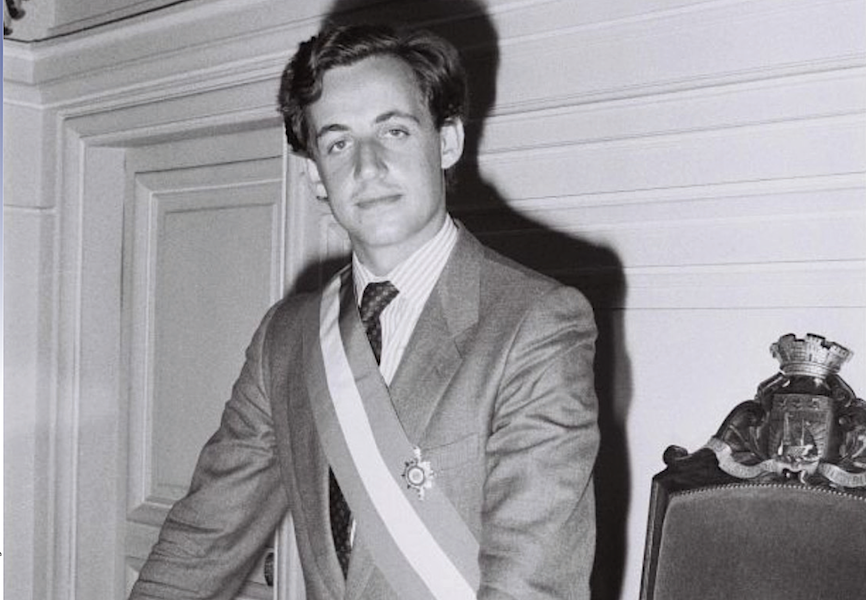
Nicolas Paul Stéphane Sarkozy was born on 28 January 1955 in the 17th Arrondissement of Paris to an aristocratic Hungarian father, Pal Sarkozy de Nagy-Bocsa and a Greek mother, Andrée Jeanne Mallah, who had both emigrated to France in the mid 1940s. They were married in Paris in 1950.
In 1959, after years of enduring the humiliations caused by the constant infidelities of her wealthy husband, Andrée Mallah finally left him, taking the young Nicolas and his two brothers with her. They settled in the 17th Arrodissement, in a house owned by her father, Bénédict Mallah who also ran his medical practice on the ground floor.
Later that year, Pal Sarkozy and Andrée Mallah were officially divorced.
Of the three brothers, it was Nicolas who most acutely felt the absence of a father figure in the household and for him, this period of his childhood was a most unhappy one.
His mother was obliged to find work in order to make ends meet and his father, despite his wealth, refused to help the family financially.
Eventually, Sarkozy was enrolled at the Lycée Chaptal, a reputable school in Paris where he failed his sixth form exams.
He was then sent to the Cours Saint Louis de Monceau, a prestigious Catholic private high school where he also was apparently a mediocre student, but where he nevertheless passed his baccalauréat in 1973.
During this period, one man had succeeded in appeasing the internal conflict that Nicolas Sarkozy was experiencing ever since his parents’ divorce : his grandfather Bénédict Mallah. This staunch Gaullist and admirer of Pope John Paul II had a strong moral influence on the young Nicolas who, in turn, looked up to him as a father figure. However, in late 1973 Bénédict Mallah died.
And it was only then that the three brothers discovered a well-kept family secret. Their grandfather was Jewish. He was born in Thessaloniki and he, along with other family members had managed to escape deportation during World War II.
In the summer of 1974, Nicolas Sarkozy, together with a close friend, decided to travel by car to Greece, try to track down any remaining family members and recover a part of the inheritance that his grandfather and his mother had never received.
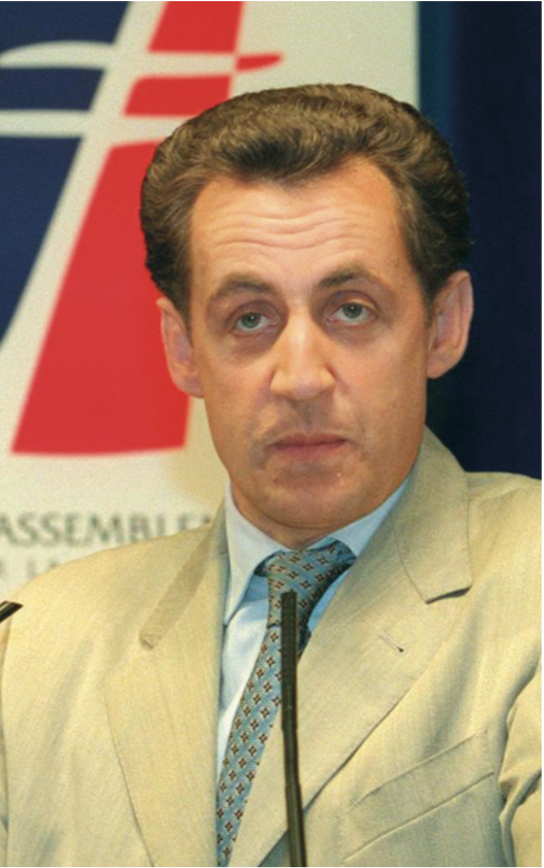
of the RPR in 1997
Maternal uncles and cousins in Thessaloniki confirmed the existence of properties belonging to the family. Sarkozy immediately decided to obtain, come what may, his mother’s rightful share of the inheritance.
After more than three hours of tough negotiations with a solicitor, he finally managed to wrest out the equivalent of around 4,000 French francs in cash.
Although this sum didn’t represent much, for Sarkozy’s mother who had moved to Neuilly-sur-Seine after her father’s death, it was a highly symbolic gesture of love and dedication on the part of her son.
The birth of an ambition
It was in this fashionable and wealthy suburb of Paris that the 21 year-old Nicolas Sarkozy embarked on his political career.
He had already decided whose side he was on; it would be his grandfather’s party, the Gaullist Party.
Previously, he had enrolled at Paris University X in Nanterre and graduated, first with a Masters degree in private law, followed by a degree in business law.
Despite the fact that Paris X Nanterre was a stronghold of leftist students and had in fact seen the birth of the student revolts in May 1968, Sarkozy joined the right wing student organisation in which he became very active.
From 1979 until 1981, Sarkozy studied at the prestigious Paris Institute of Political Studies, known as Sciences Po, but failed to graduate due to his insufficient knowledge of the English language.
However, he successfully passed the bar examination and began practicing as a lawyer specialising in business and family law.
He was even, for a time, one of Silvio Berlusconi’s French lawyers.

One morning in 1974, Nicolas Sarkozy went to the local UDR Party (Union for the Defence of the Republic) offices in Neuilly and applied for membership. And it was soon after that the young militant had the opportunity of showing his determination.
He would be among the first to arrive in the mornings and the last to leave; he would participate in all meetings, distribute political tracts and organise events.

He quickly rose among the ranks in the party apparatus and at university, he demanded that lectures continue at the Law faculty despite a strike organised by left-wing student unions.
He also managed to convince and recruit a considerable number of his fellow students for the party.
Sarkozy has said that being abandoned by his father shaped much of who he is today. He also has said that, in his early years, he felt inferior in relation to his wealthier and taller classmates. “What made me who I am now is the sum of all the humiliations suffered during childhood”, he said later.
But very rapidly, Neuilly-sur-Seine became too small a playground for the ambitions of the budding politician. He began spending more and more time at the headquarters of the UDR Party in Paris.
In May 1975, Sarkozy was given an opportunity to present some aspects of the party programme for a televised event. He instinctively felt that this would be a pivotal moment; he practiced speaking to an imaginary audience before an imaginary TV camera until he felt he could master the required techniques.
A few weeks later in June, the party bosses and militants of the UDR gathered in Nice for their annual conference.
After the big names in the party had delivered their speeches, a number of young party members were invited to briefly address the audience; among them was Nicolas Sarkozy.
He was initially allotted only four minutes speaking time, but he displayed such exuberance and overflowing enthusiasm that he managed to win over the audience in a speech that went well beyond the time limit.
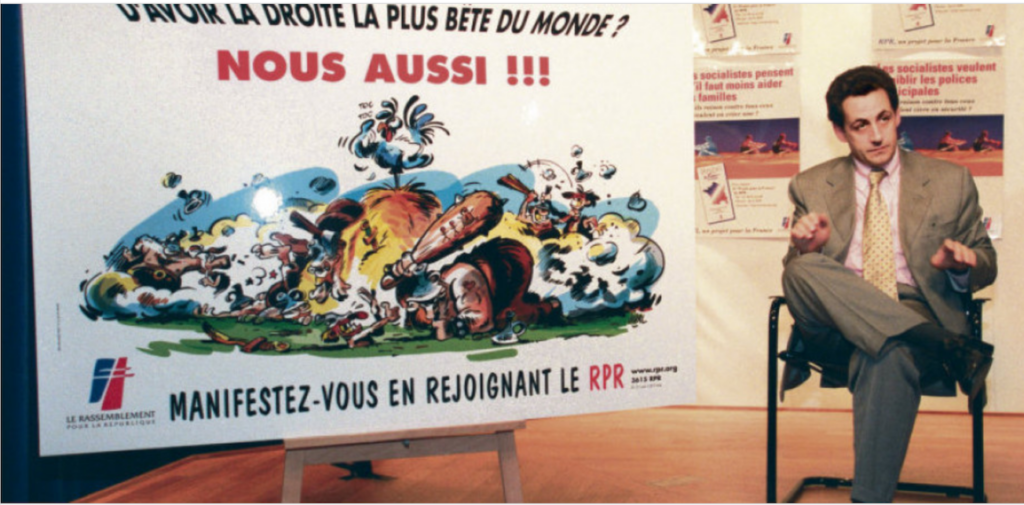
A speech that certainly did not go unnoticed by the most important person in the conference hall. The party leader, Jacques Chirac.
In 1976, Chirac founded the RPR Party (Rally for the Republic), a new political movement that would carry forward with added impetus the ideals of Gaullism. Sarkozy publicly proclaimed his unconditional support for its leader :
“ What interests us is to help Jacques Chirac take full charge of his destiny; a destiny that is great…so very great ! This current majority government is of no interest to us…it belongs to the past !”
Nicolas Sarkozy evidently relished the debating forum and strived to perform like the famous showmen he admired, including television personalities and pop singers whose styles and communication techniques he studied closely.

And in October 1977, there was one particular event that Sarkozy did not want to miss at any cost. The civil wedding ceremony of famous French singer Michel Sardou at Neuilly city hall. To add to the glamour, the bridegroom’s witness happened to be another super star, Johnny Halliday who was also one of Sarkozy’s favourite singers.
That day, when Sarkozy tried to gain access to the reception room, he was refused entry by the security people who did not believe him when he declared that he was a city councillor. What’s more, he had forgotten to bring his official identification papers with him and the chief of security thought he was much too young hold such a position in the city council.
The extreme humiliation that Sarkozy felt that day stayed with him for a very long time; until six years later, when the young councillor had been elected, at the age of 28, mayor of Neuilly-sur-Seine.
A new conquest
In August 1984, Sarkozy cut short his holiday in Corsica in order to officiate at the civil wedding of famous television host Jacques Martin. This was another media event that would put the new mayor and his city in the spotlight.
But it also rather unexpectedly proved to be an event that completely changed the course of Sarkozy’s private life.
In the course of the ceremony, the mayor showed himself to be extremely friendly towards the newlyweds and addressed the bridegroom in a very surprising, even enigmatic manner:
“At this moment, I would like to make you a present of something, but I simply cannot give it to you… you couldn’t possibly use it. I would have liked you to have my mayoral sash!”

and Nicolas Sarkozy © geneanet.org
This was a cryptic message that nobody understood at the time. What Sarkozy really meant was that even though he was declaring the couple man and wife, he would have liked Jacques Martin to have been the mayor and he the bridegroom.
At the time, Sarkozy himself had been married for two years to Marie-Dominique Culioli, whose uncle had been mayor of Neuilly-sur-Seine from 1947 to 1983 and Sarkozy’s political mentor. She was a very discreet woman who shunned parties, receptions and glamorous events that her husband, on the contrary, was most eager to attend.
The couple had recently become close friends of the television host Jacques Martin and his wife Cécilia; the same man at whose wedding Sarkozy had officiated a few years earlier.
However, this friendship would soon be undermined by Sarkozy’s feelings for Cécilia that were becoming more and more apparent.
Nicolas Sarkozy’s private life was heading for a bumpy ride.
The mayoralty of Neuilly had given him a political base and a certain credibility, but he knew that to go further, he needed to remain in the wake of Jacques Chirac, the mayor of Paris.
He began showing up at Chirac’s office at all times of day and night and showed himself ready to take on any task that was asked of him.
He earned the trust of not only Chirac himself but also that of his immediate family and inner circle.
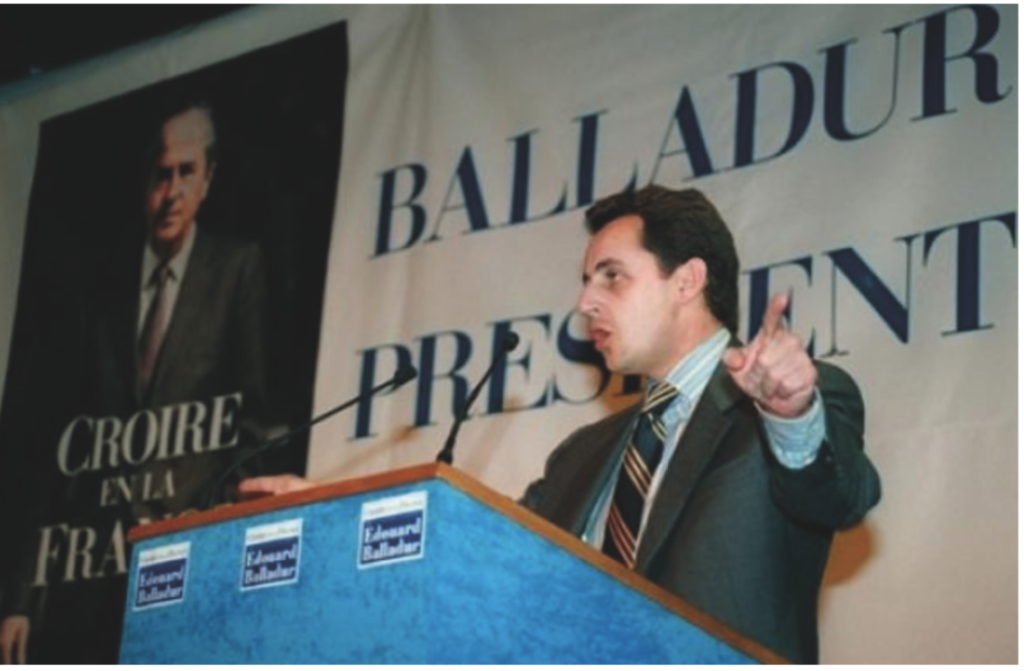
The favourite son ?
Over the course of the following months, Chirac’s trust in Sarkozy became so great that their relationship was more akin to that between father and son.
Chirac bestowed a number of responsibilities upon his protégé, including one in which Sarkozy excelled : the renewal of the public image of the RPR Party in the media.
During the campaign for the presidential elections of 1988, Sarkozy did all he could to rejuvenate Chirac’s public image . He began by modernising and revitalising party conventions and public meetings, on the same principles as those used by popular television personalities and performers in their shows.
All this naturally did not go unnoticed by Chirac’s close entourage, as well as a man who would be pivotal in Sarkozy’s future political career. That man was Edouard Balladur, Chirac’s closest confidant and advisor.
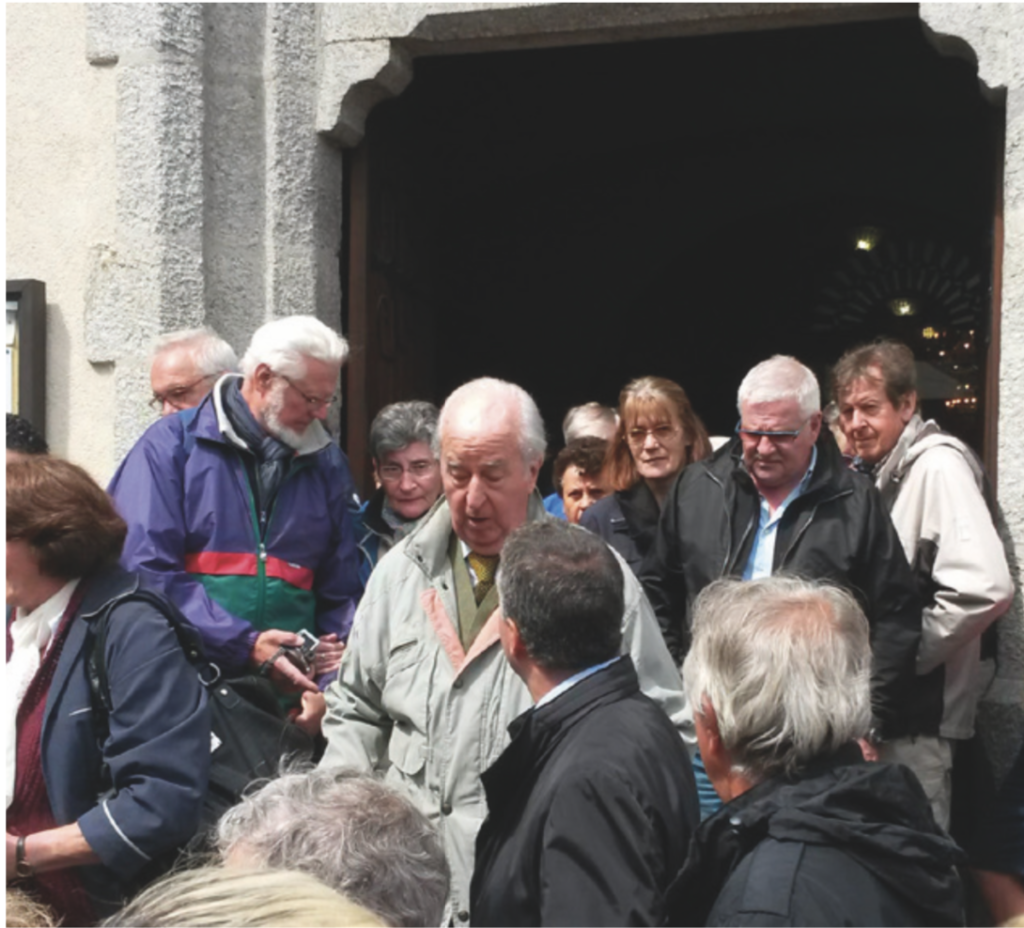
Nicolas Sarkozy quickly realised that Balladur was someone whose trust he must also gain in order to consolidate his own plans for the future.
And so, he placed himself in the position of someone who would simply observe, from a distance, the inner workings of these two powerful men.
But despite all the hard work put in by Sarkozy and his staff during the campaign, the results failed to match the high expectations. In May 1988, Jacques Chirac lost the presidential election for the second time.
A new period of cohabitation with the socialists was on the cards, but this time Chirac was reluctant to accept the post of François Mitterand’s Prime Minister.
For his part, Nicolas Sarkozy was keen to find his place in the new government majority and just like Jacques Chirac and Valéry Giscard d’Estaing before him, he had set his sights on the post of Minister of Finance. A post he would occupy in due course.
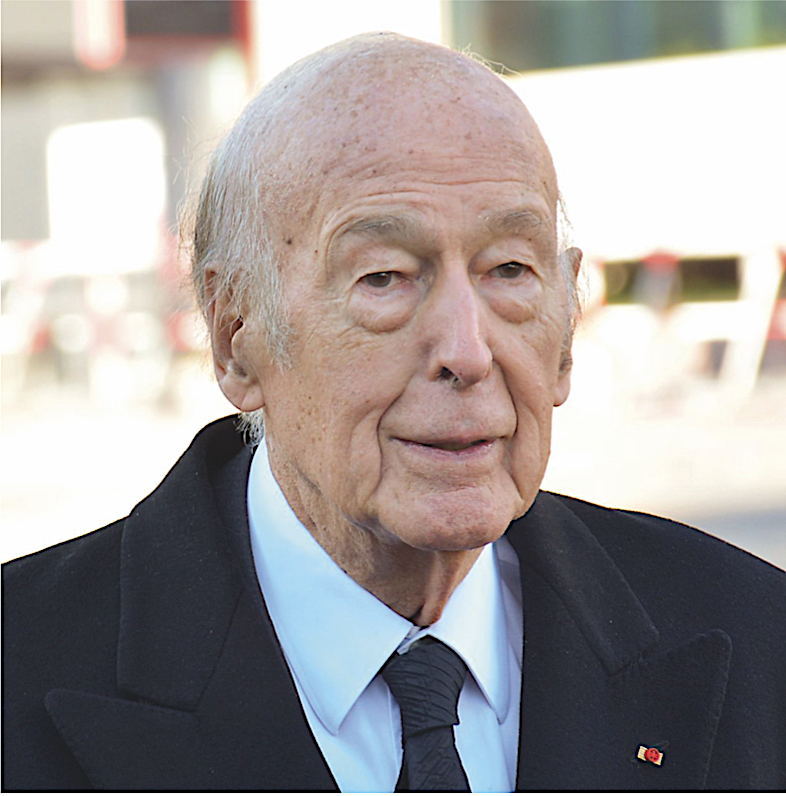
french President
© Wikicommons
In May 1993, when Edouard Balladur was designated as Prime Minister, Sarkozy made it known to him, his ambition of taking over the Ministry of the Budget.
Eventually, Sarkozy brought with him his team of trusted collaborators, as well as his partner Cécilia who was to work for him as his trusted personal secretary.
After the initial enmities and snide remarks from the employees, Sarkozy and his team soon settled in and smoothly and efficiently set about conducting the Ministry’s affairs.
The reluctant hero
But it was an unexpected and totally unrelated event that once again placed Sarkozy in the media spotlight.
In May 1993, twenty one nursery school children together with their mistress were taken hostage in a school in Neuilly-sur-Seine. At the time, Nicolas Sarkozy was attending a meeting at the Prime Minister’s office and was unaware of the events that were unfolding in Neuilly.
Some 40 men from the Special Forces of the French police take up positions around the school and begin negotiating with the hostage taker. They soon discover that the man who is demanding a ransom of 100 million French francs has placed explosive charges in the classroom and has threatened to blow up the school should anyone try to force his way inside.
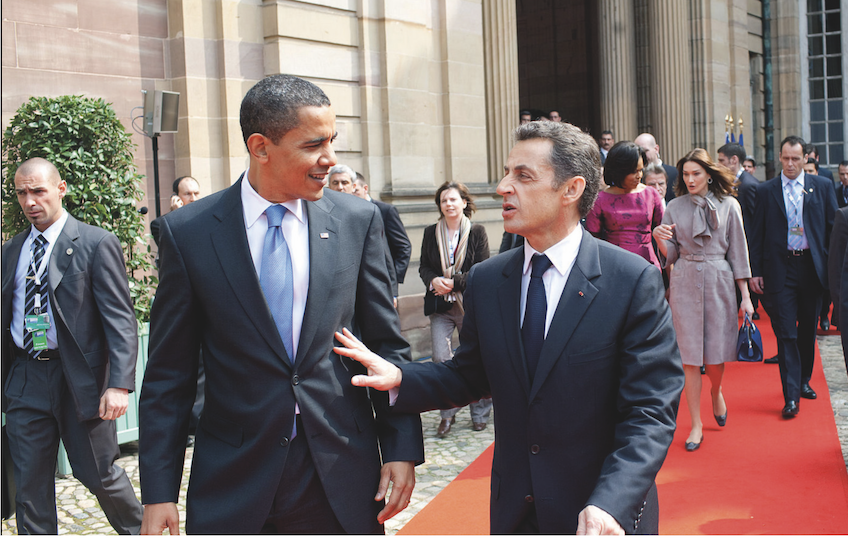
Nicolas Sarkozy soon arrived at the scene and against the advice of police, the Prime Minister and the Interior Minister, went into the classroom to directly negotiate with the hostage taker. In the meantime, the authorities had arranged for the ransom to be brought to the school in cash.
A few hours later, fifteen children – some carried away by Sarkozy himself – were released at varying intervals until there were only six left inside.
Some 45 hours later, on the morning of May 15, while the hostage taker had dozed off, the police forced their way in and freed the remaining children. The hostage taker was killed.
Nicolas Sarkozy became the focus of all the attention from the domestic and international media that had gathered in front of the school. There was a spectacular rise in his popularity ratings and after this incident, he became a minister like no other.
At this point, there were two years left before the next presidential election and a new event -a political one this time – was to radically alter the course of Sarkozy’s political career.

At a crossroads
By the autumn of 1993, Nicolas Sarkozy, Minister of the Budget as well as government spokesman had become the indispensable member of the Prime Minister’s cabinet. Edouard Balladur himself was riding a big wave of popularity with ratings as high as 75% in various polls.
Balladur and his inner circle were now in a position to legitimately envisage a bid that could take them to the ultimate position.
As for Nicolas Sarkozy, he now had to choose sides, a difficult choice between remaining faithful to Jacques Chirac or accompanying Edouard Balladur in his quest for the supreme position. His decision was made even more difficult as not one single name from the right had yet been put forward.
Who should he choose ? Sarkozy invited 41 members of his RPR Party to lunch at his office to discuss which of the two leading lights should be given their full backing. They decided that Balladur was their man.
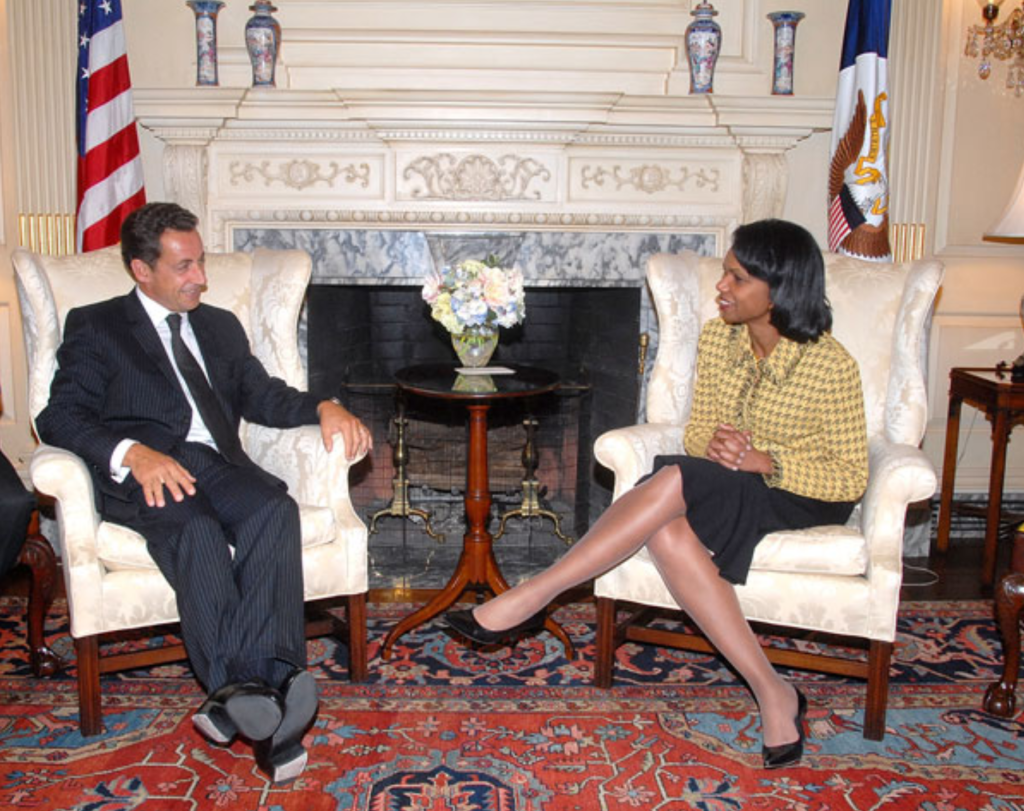
bilateral meeting in Washington, D.C., 12 September 2006
Jacques Chirac considered Sarkozy’s action an act of treason for which he probably never forgave him, and in November 1994, he declared that he would run for president in the upcoming election.
Meanwhile, in view of the favourable opinion polls, Balladur’s camp continually flaunted its optimism until January 1995, when Edouard Balladur, in a solemn television broadcast, officially announced his candidature. Sarkozy immediately threw all his weight behind his boss in meeting after meeting :
“We are 20.000 strong; he needs all the support you can give. France needs him. I give you Edouard Balladur !”
But despite all of Sarkozy’s enthusiasm and tireless efforts in trying to give a modernist and progressive image to Balladur, Jacques Chirac overtakes him in the opinion polls.
In the first round of voting Balladur obtains only 18.5%, trailing Chirac in second place with 20 % and the Socialist candidate Lionel Jospin with 23.4%.
With Balladur eliminated from the race, Sarkozy realised the extent of the miscalculation he had made.
But ironically, things were far from over for him. He and Balladur promptly announced they were now going to back Jacques Chirac. They both attended a major RPR rally where they were both copiously booed and jeered by Chirac supporters and party militants. Some even spat at them.
And to rub salt in the wound, following the second round of voting in May 1995, Sarkozy witnessed Chirac’s victory. The man who had been his political mentor finally became the president of France.
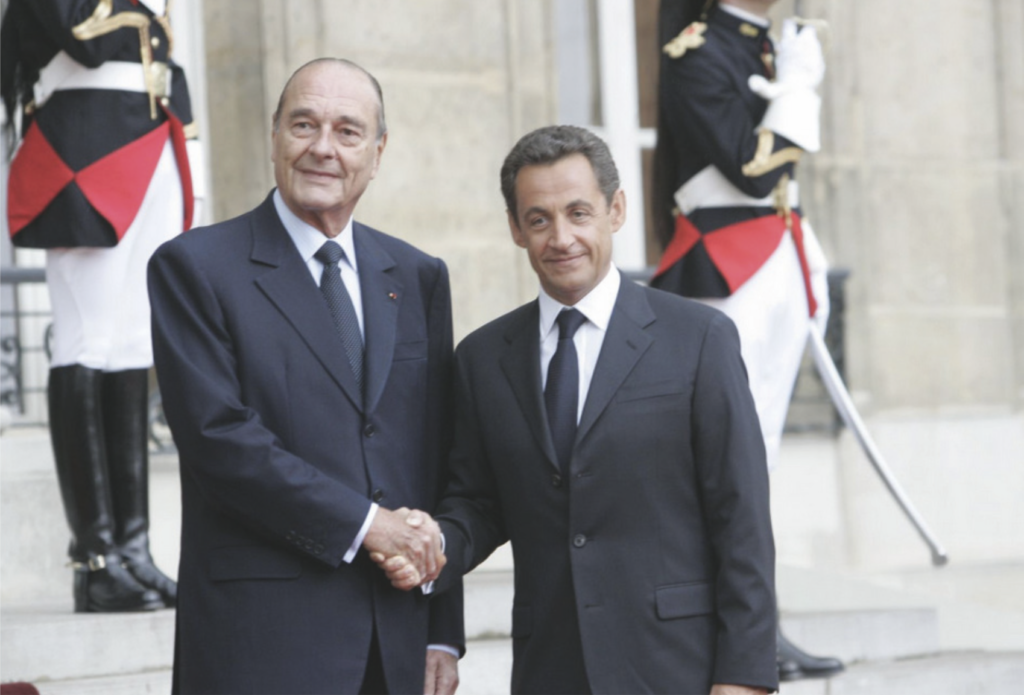
Présidence de la République
Spell in the wilderness
Faced with no other choice, Nicolas Sarkozy withdrew and fell back on his functions at Neuilly city hall. This proved a difficult and lonely period for the ambitious Sarkozy who had effectively fallen from grace.
But he had been bitten by the political bug ever since his teens and he had elaborated far too many projects in his head to just leave politics altogether and embark on a career in law.
In fact, he was constantly thinking about how he could reposition himself on the political chessboard after those recent damaging episodes in his career.
He knew deep down that it was only by mending his relations with Jacques Chirac that he would succeed in freeing himself from this quagmire.
However, Chirac had no intention of coming to the rescue of someone he had considered as his spiritual son and who had then betrayed him so unashamedly.
But in politics, nothing is certain. Chirac had been defeated in the legislative elections and parliament had been dissolved. What’s more, the cohabitation with the Socialists had completely changed the factors.
A politically weakened Jacques Chirac felt that it was time to forgive and forget; this is what politics is all about. He eventually accepted the idea of seeing his former protégé.
And so, Nicolas Sarkozy eagerly set to work in getting Chirac reelected in 2002.

The first round of voting sees Chirac defeat the Socialist candidate, Lionel Jospin. He now had to face the far right candidate Jean-Marie Le Pen; there was now no doubt as to the final outcome. So much so that speculation was already rife as to the name of Chirac’s future Prime minister.
This was the second time that Sarkozy was secretly hoping to accede to that post and even though he was among the early favourites, Chirac finally designated Jean-Pierre Rafarin.

President Putin and his wife, Lyudmila, meeting with French President Jacques Chirac and his wife, Bernadette (far right)
© Wikicommons
However, Sarkozy was named Minister of the Interior, which is after all the second most important position after that of the Prime Minister.
But deep down, Sarkozy felt he deserved better.
He resolved to show all that he was capable of in his new capacity, and in May 2002, he arrived at the ministry to take up his post. But he was not alone; Cécilia whom he had married in 1996 accompanied him. Sarkozy wanted to send a clear message that from now on, he would be climbing the political ladder of power with his wife.
He even famously declared : “She is the non-negotiable side of myself !”
Presidential ambitions
Sarkozy’s wife was by his side at all times; she meticulously took care of his daily agenda, without overlooking the slightest detail. She also acted as his adviser on many political issues, as well as Sarkozy’s social and professional dealings with his colleagues and other acquaintances.
In a carefully worked out strategy aimed at projecting a new public image of himself and his family, Sarkozy’s offices at the ministry were, for the first time, declared no longer out of bounds for television cameras and press photographers.
Within the space of a few months, Sarkozy became a prominent media figure and the most popular minister in Jean-Pierre Rafarin’s cabinet. He won over the media, the political world, and of course, the general public who found his lifestyle utterly enticing.
Talk of Sarkozy’s presidential ambitions was no longer taboo and articles and opinion columns began to appear regularly in the press.
In July 2004, Sarkozy who, in the meantime, had been renamed Minister of Finance attended the 14 July annual garden party at the Elysée Palace. He arrived with his elegantly-dressed wife and immediately all eyes were on him again. He literally stole the show.
Jacques Chirac’s growing annoyance at the young minister’s having the gall to covet the president’s post, not to mention his spectacular rise in popularity, was publicly expressed on the occasion of the president’s annual speech.
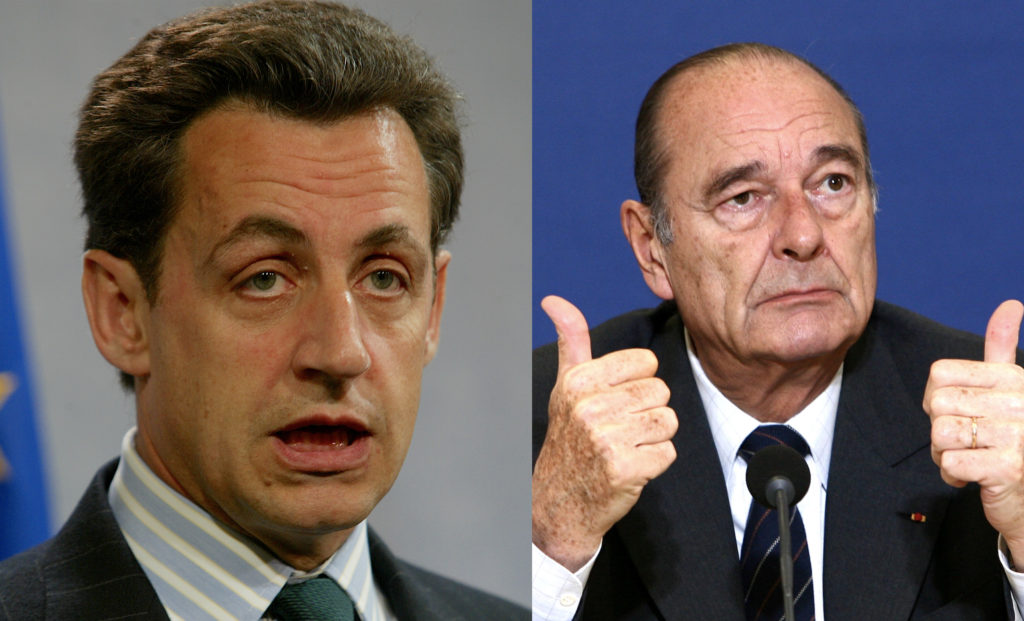
At one point, Chirac declared : “There is no dispute of any sort between the Minister of Finance and myself…and for a simple reason. Notably, as far as expenditure is concerned, I decide and he carries out the orders !”
However, these words of reprobation fell on deaf ears. In fact, Sarkozy had already embarked on the next stage of his quest. He knew full well that in order to attain his goal, he needed a party and what’s more, his victory must be grandiose.
In November 2004, the UMP Party (Union for a Popular Movement) organised a gigantic meeting with over 40.000 militants in attendance.
It was planned along the lines of American political conventions, on a grand scale. Nothing was left to chance; this was an event that had to impress and make a lasting impact.
Among the attendees was President Chirac’s wife, Bernadette. She, contrary to her husband, had decided that Sarkozy’s treacherous act of 1995 was something to be forgotten.
“ I am as ready as I will ever be. I am ready because deep down inside, I know that France isn’t afraid of change any longer. In fact, France expects change. And it is we who shall bring about this change ”.
Following Sarkozy’s nomination to the leadership of the UMP, he stepped down from his government post in accordance with a rule established by Jacques Chirac himself.
There was now no doubt in anyone’s mind as to Nicolas Sarkozy’s plans for the future.
However, during the campaign for the referendum on the Treaty establishing a Constitution for Europe, there occurred an event that had a profound effect on Nicolas Sarkozy’s private as well as public life.
In May 2005, what began as vague rumours about the deteriorating relations between Sarkozy and his wife Cécilia became so insistent in the media that Sarkozy had no choice but to intervene personally and to try and quell speculations on his private life. He publicly admitted that his marriage was going through a rough patch but added that this was something that could happen to anyone.
But the worst was yet to come. Towards the end of May, the Swiss newspaper Le Matin published an article revealing that Cécilia had left Sarkozy for Richard Attias, a French-Moroccan national who was head of the New York branch of Publicis, a French multinational advertising and public relations company. Le Matin later published other accusations, again of a private nature which led to Sarkozy suing the newspaper.
In June 2006, after one year of uncertainty, dashed hopes and disappointments, Cécilia did return. Sarkozy was reappointed as Interior Minister and the couple tried to pick up the pieces.
But as far as Cécilia’s role in her husband’s day to day affairs were concerned, nothing would ever be the same again. Sarkozy, the man, was certainly going through a great deal of moral suffering throughout his campaign for the 2007 presidential election.

He won the first round of voting and his wife was next to him at his party headquarters when the results were announced.
For the second round, Nicolas Sarkozy would confront the Socialist candidate, Ségolène Royal; the feeling of expectancy had reached its peak when the final results came through.
Nicolas Sarkozy had won with 53% of the votes and by becoming president, he at last, fulfilled his lifelong ambition. He promised new developments in France, including radical economic reforms that would reduce taxes and liberalise the country’s labour market, and closer relations with the United States.

But as far as he was concerned, the celebrations couldn’t be complete; his friends, his mother and even his father, together with his brothers were there, but Cécilia was not; she did not deign to come and join in the victory celebrations.
Highs and the lows of life at the top
Sarkozy’s first year in office was a difficult one on the political front. Shortly after his appointment, he began negotiations with Colombian president Alvaro Uribe and the left-wing FARC guerillas in view of the release of hostages held by the rebel group, including especially Franco-Colombian politician Ingrid Betancourt.
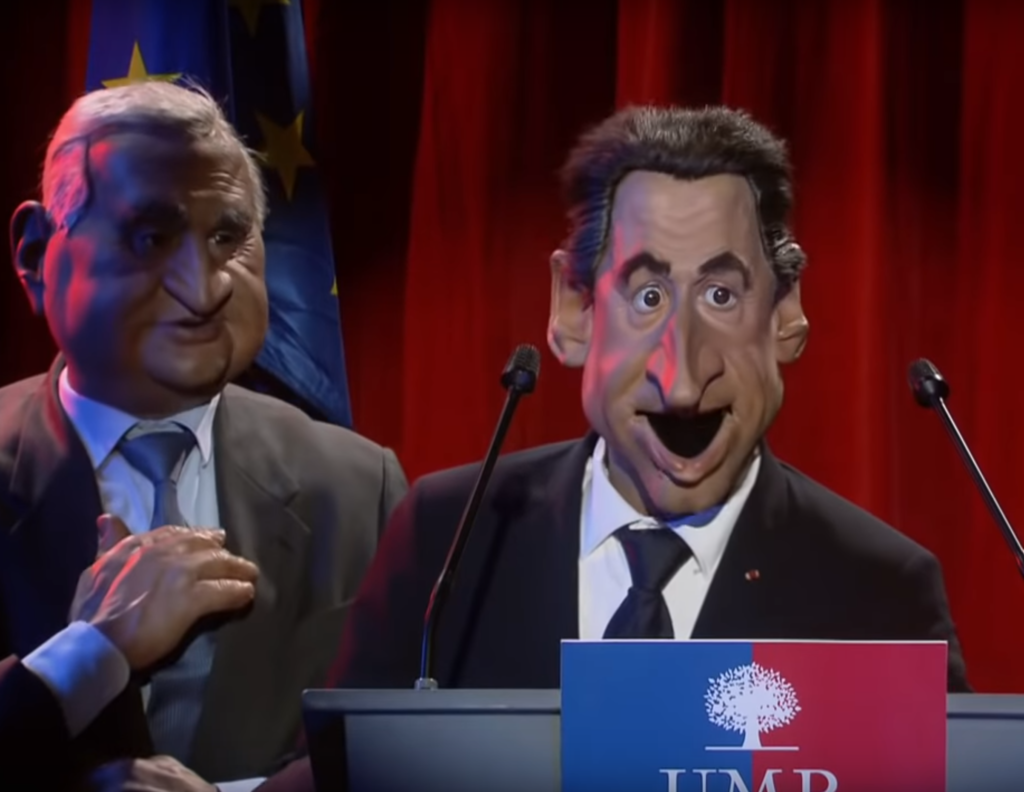
“Guignols de l’info”
His next move drew worldwide attention as he and his wife Cécilia played a major role in gaining the release of six Bulgarian nurses who had been held in Libya since 1999. While applauding the release, some in France and the EU criticised Sarkozy’s involvement and especially his wife’s participation.
In the following months, Sarkozy carried out some of his promised cuts in taxes and labour market reforms. He decided not to eliminate the 35-hour maximum on the standard work week but rather to use tax relief on overtime pay to justify the law’s rigidity. He also won narrow approval from the legislature for a constitutional change to reduce the presidency to two five-year terms.

Pittsburgh, Pa., Sept. 24, 2009 © Wikicommons
He made several unexpected cabinet appointments, including the country’s first woman Finance minister, Christine Lagarde, the first full cabinet member of North African origin, Rachida Dati, and a maverick Socialist, Bernard Kouchner as Foreign minister. Sarkozy also nominated Socialists for several other posts in the government.
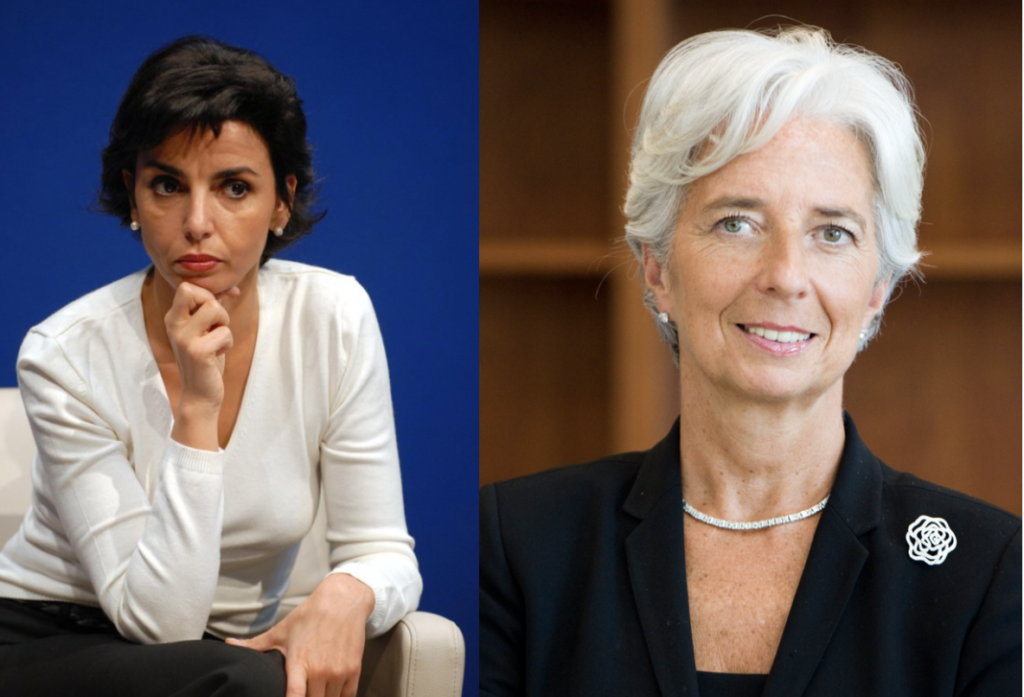
Another major, albeit controversial event in 2007 was Sarkozy’s invitation of Libyan leader Col. Gaddafi to France. There were objections from the opposition as well as from members of his government. France agreed to sell 21 Airbus aircraft and signed a nuclear cooperation agreement. There were also plans for the sale to Libya of more than a dozen Rafale jet fighters as well as military helicopters.
French media had traditionally avoided too much interest in the private lives of French leaders. Sarkozy’s personal problems were well known even before his presidency; then came news of his separation from his wife. And later that year, in October 2007, Sarkozy and Cécilia divorced.
Less than a month later, he met Italian-born singer, songwriter and former fashion model Carla Bruni at a dinner party, and soon entered into a relationship with her. They were married in February 2008 at the Élysée Palace.
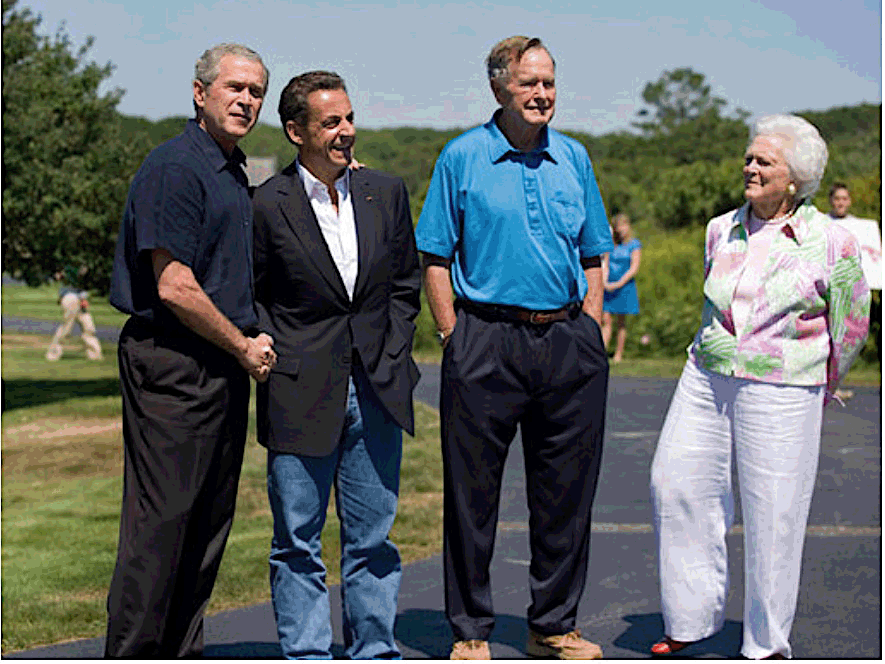
Compared to his predecessors, Sarkozy was pro-American and he showed signs of being more accommodating to American culture and ideologies. In this respect, he proved to be somewhat more troublesome to some of his Eurozone partners.
In 2009, he worked with Egyptian ex-President Hosni Mubarak, to bring up a plan which called for a ceasefire along the Gaza Strip. The plan was welcomed by then US Secretary of State, Condoleezza Rice who claimed that the move would bring forth real security.

Kadhafi © Afriquemediatv
In 2011, he was among the first world leaders to demand the resignation of former Libyan strongman Col. Gaddafi and called for military intervention in Libya. He also levied a no-fly
zone and promised French military assistance to the Libyan National Transitional Council. The move earned him support from political groups on all sides.
After five years in power, Sarkozy was defeated by a margin of only 3.2% by Socialist Party candidate François Hollande in the 2012 election. Interestingly, he did not take his defeat negatively and instead supported Hollande’s appointment.
Shrouded in clouds of woe
Since his defeat in 2012, Sarkozy has faced a series of investigations into allegations of corruption, fraud, favouritism and campaign-funding irregularities.
One particularly high-profile case concerns alleged illegal funding for his election campaign in 2007.
During an interview with Euronews in 2011, Col. Gaddafi’s son stated that Libya had donated €50 million to Sarkozy’s presidential campaign in exchange for commercial access and other favours which were not honoured; he demanded Libya be reimbursed.
The affair took on major and damaging proportions when French magistrates later came upon diaries of former Libyan oil minister Shukri Ghanem in which payments to Sarkozy were mentioned. However, shortly thereafter Ghanem’s body was found floating in the Danube in Austria. Therefore, no corroboration became possible.
Sarkozy denied the claims, saying his Libyan accusers wanted revenge for his decision to send French warplanes during the 2011 uprising. And Les Républicains (LR) Party which Sarkozy founded in 2015 to succeed the UMP, meanwhile issued a statement saying the former president had their full support. Its spokesman Christian Jacob later suggested that the accusations against Sarkozy were politically motivated.
But how will Nicolas Sarkozy be remembered?

Photo Philippe Warrin
His reforms will be his best legacy. After François Hollande came to power, his close adviser and Finance Minister, Michel Sapin confirmed this by saying that the new president will not reverse most of Sarkozy’s work; merely a few measures would be replaced, such as minimum wages or territorial reform.
What better tribute could Nicolas Sarkozy have hoped for than seeing his work recognised by the political opponent who accused him of having done nothing for five years?
Hossein Sadre
Click here to read the 2020 April edition of Europe Diplomatic Magazine


